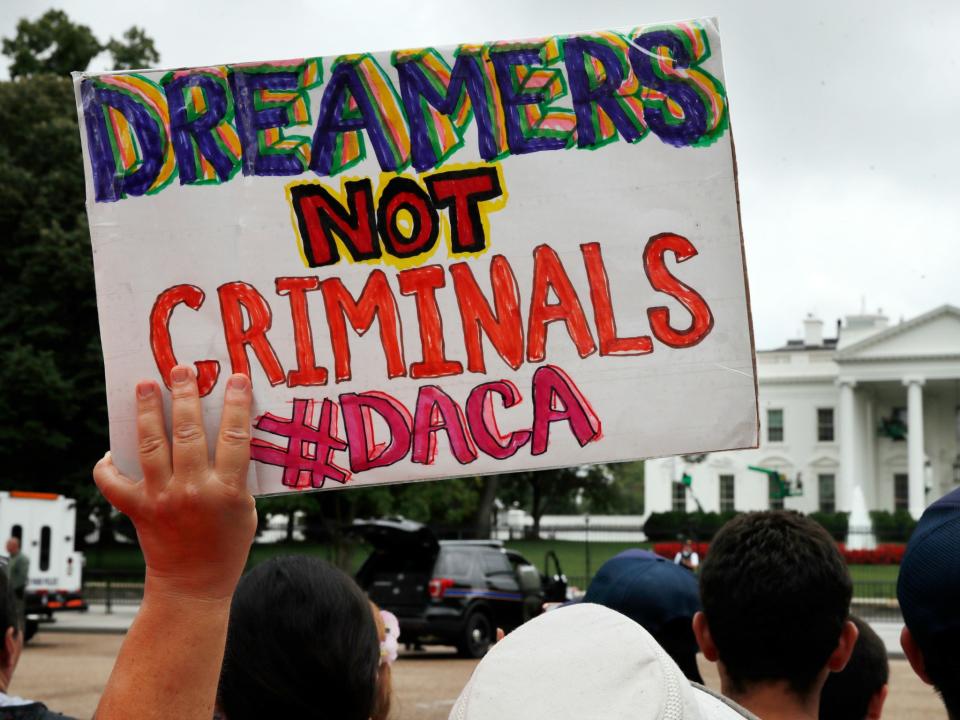DACA repeal will conservatively hit GDP by $105 billion over five years, Mark Zandi says
The potential deportation of about 800,000 so-called “Dreamers” could have significant negative consequences for the US economy.
Trump’s decision to repeal the Deferred Action for Childhood Arrivals (DACA), signed by President Obama in 2012, will reduce the labor force by 0.5% in the five years following implementation, according to Moody’s Chief Economist Mark Zandi.
By ending legal protections for eligible immigrants who entered the country illegally as minors, Trump’s decision will also hit GDP by 0.5 percentage points, Zandi added, translating to a loss of $105 billion over that same period.
Zandi noted that this is a conservative estimate of the economic impact of the repeal, as it assumes no other knock-on effects, like scaring off other foreign immigrants from coming into the US.

“If the US can’t figure out how to keep the dreamers, then this is sending a clear signal to all immigrants that they are not welcome here,” Zandi added.
DACA repeal will make the high-skilled labor shortage worse
“Repealing DACA at this time is especially bad economic timing, as the job market is tight and quickly getting tighter, particularly for workers that the dreamers are and will likely become,” Zandi said. “The dreamers are on track to be a highly educated group and losing them will be a significant blow to businesses already struggling to find educated and skilled young workers.”
Zandi estimates about half of the Dreamers are in the work force and the other half will enter within the next five years.
To be eligible for DACA, applicants must have arrived in the US before age 16 and lived there since June 15, 2007. They had to be under 31 when the policy was enacted in 2012. In other words, many of the Dreamers are in the prime-age working population (ages 25 to 54).
In addition to providing more workers, immigrants have proven to be twice as likely to become entrepreneurs as native-born US citizens, creating even more job opportunities.
In his announcement, US Attorney General Jeff Sessions said that DACA allowed immigrants to take jobs that would have otherwise gone to US citizens. But Zandi explained this is false.
“Kicking out the dreamers will not open up jobs for natural born citizens as the job market for educated workers is very tight and set to get tighter,” Zandi explained. “There are already a record number of open positions in the types of jobs that dreamers work in, and this will increase as job growth continues to significantly outpace the growth in the labor force. This will be especially true if there is no increase in H1-B and L1 visas, which seems likely under the Trump Administration.”
‘Pro-business administration’?
While President Trump has consistently promoted a message of pro-growth and pro-business, economists say that some of his proposed policies run counter to that goal.
“This country was founded by immigrants looking for a better life,” the noted economist Jeremy Siegel said in a recent interview with Yahoo Finance. “The anti-immigrant stance is really opposed to that. My grandfather came over from Europe because he wanted a better life. The American dream for him was ‘freedom’ — to do what he wanted to do, not be automatically discriminated against. That was what drove people to America. And we did become the richest country in the world because we allowed people to do what they could do.”
And Zandi emphasized that this decision runs counter to a pro-growth agenda.
“Repealing DACA is a bad economic policy, and runs completely counter to the Trump Administration’s goal of raising the economy’s sustainable growth rate,” Zandi said. “Indeed, the only way to significantly lift long-run economic growth anytime soon is to increase immigration, not discourage it.”
Economist Alan Krueger echoed this message.
“Rolling back DACA would be a big step in the wrong direction if the Trump administration wants to increase the labor force, support future entrepreneurs, increase jobs and incomes for Americans, and raise economic growth,” Krueger said.
—
Nicole Sinclair is markets correspondent for Yahoo Finance
Please also see:
Why $475,000 isn’t actually that expensive for Novartis’ new drug
Gilead may have just bought itself a drug pricing controversy
The shift from brick-and-mortar to online may be a hopeless strategy
Digital ads aren’t working for big consumer brands


